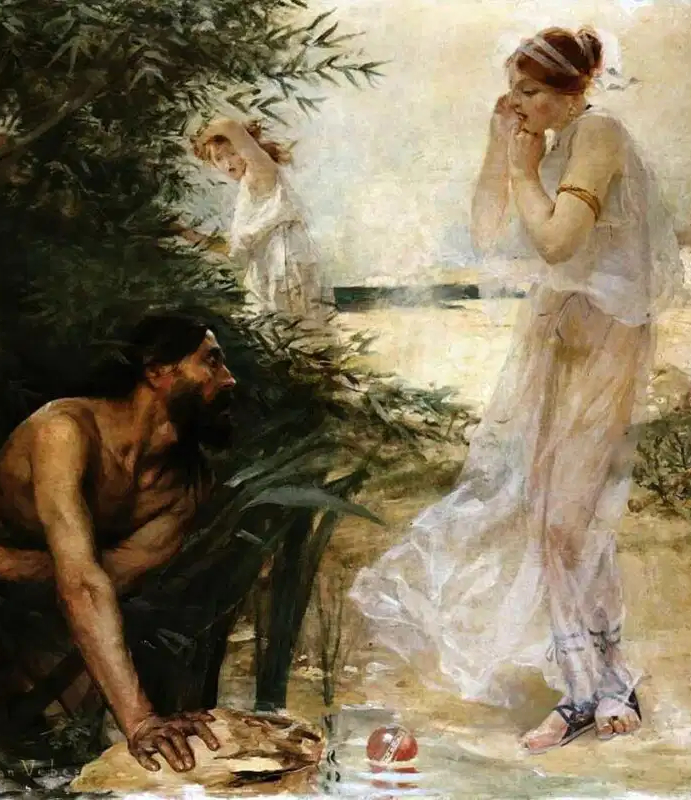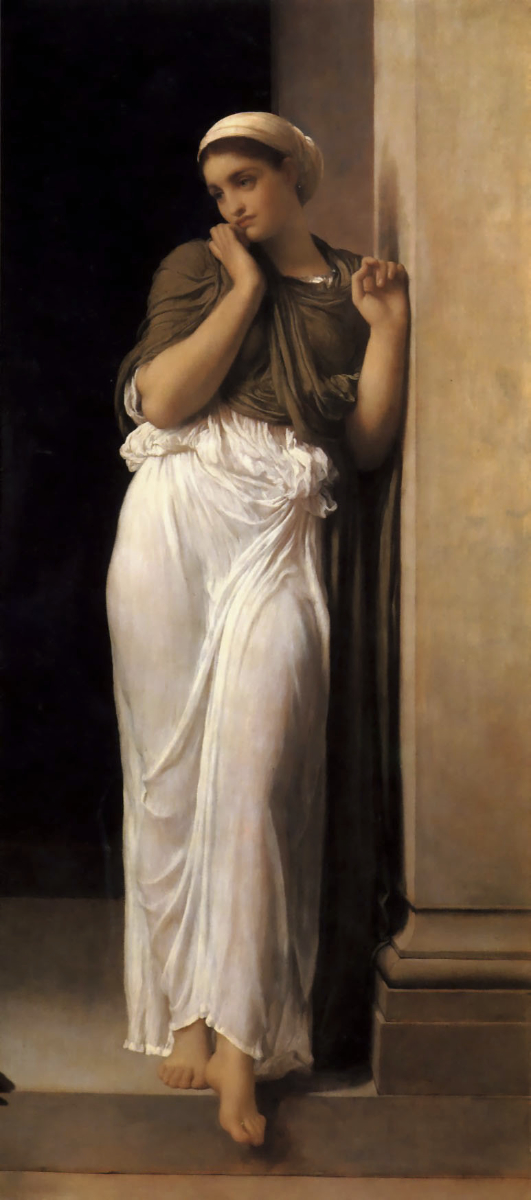Nausicaa, also spelled Nausicaä or Nausikaa, is a character in Homer’s Odyssey. She is the daughter of King Alcinous and Queen Arete of Phaeacia. Her name means “burner of ships”. In Book Six of the Odyssey, Odysseus is shipwrecked on the coast of the island of Scheria (Phaeacia in some translations). Nausicaä and her handmaidens go to the seashore to wash clothes. Awakened by their games, Odysseus emerges from the forest completely naked, scaring the servants away, and begs Nausicaä for aid. Affected by the unfortunate hero, she gives Odysseus some clothes and takes him to the edge of the town. Keeping him secret, she goes ahead into town, telling him to go directly to Alcinous’s house and make his case to Nausicaä’s mother Queen Arete, the family’s matriarch. Odysseus approaches Arete and wins her approval, and he is received as a guest by King Alcinous. During his stay, Odysseus recounts his adventures to Alcinous and his court, a frame story for a substantial portion of the Odyssey. Alcinous then generously provides Odysseus with the ships that finally bring him home to Ithaca. Nausicaä is young and beautiful; Odysseus says she resembles the goddess Artemis. She has several brothers. According to Aristotle and Dictys of Crete, she later married Odysseus’s son Telemachus, and had one or two sons, Poliporthes or/and Persepolis. Homer gives a literary account of a love which is never expressed (one of the earliest examples of unrequited love in literature). Nausicaä is presented as a potential love interest for Odysseus: she tells her friend that she would like her husband to be like him, and her father tells Odysseus that he would let him marry her. The two do not have a romantic relationship, however, and she marries Telemachus in some versions. Nausicaä is also a mother figure for Odysseus; she ensures his return home, and says “Never forget me, for I gave you life”. Odysseus never tells Penelope about his encounter with Nausicaä, out of all the women he met on his long journey home. Some suggest this indicates a deeper feeling for the young woman. According to some versions, the father of one of Nausicaa’s sons was Odysseus himself rather than his son Telemachus.
| Alias Nausicaä |
| Real Names/Alt Names Nausicaä |
| Characteristics Myths & Legends, Iron Age |
| Creators/Key Contributors Homer |
| First Appearance Greek mythology |
| First Publisher ○ |
| Appearance List Literature: Homer’s Odyssey (c. 8th century BCE, English 1614), Homer’s Iliad (c. 8th century BC), Virgil’s Aeneid (29 to 19 BC), 5th century plays by Aeschylus, Sophocles (Ajax, Philoctetes), and Euripides (Hecuba, Rhesus, Cyclops), Plato’s Hippias Minor, Shakespeare’s Troilus and Cressida (1602), Dante Alighieri’s Divine Comedy (1308–1320), Lord Tennyson’s “Ulysses” (1842), The Story of Greece: Told to Boys and Girls by Mary Macgregor (191-?) [Internet Archive], Frederick Rolfe’s The Weird of the Wanderer (1912), James Joyce’s Ulysses (1918–1920), Nikos Kazantzakis’ The Odyssey: A Modern Sequel (1938), Eyvind Johnson’s Return to Ithaca (1946), The Luck of Troy (1961), et. al. Film: The Mysterious Island (1905), L’Odissea (1911), Ulysses (1954), Ulysses (1955), The Trojan Horse (1961), The Fury of Achilles (1962), Ulysses Against the Son of Hercules (1962), The Lion of Thebes (1964), et. al. Comics: Blue Bolt vol. 2 #1-2, Treasure Chest vol. 14 #5. |
| Sample Read The Odyssey (Translated by W. C. Bryant, August, 1871) [Standard eBooks] |
| Description Nausicaa, also spelled Nausicaä or Nausikaa, is a character in Homer’s Odyssey. She is the daughter of King Alcinous and Queen Arete of Phaeacia. Her name means “burner of ships”. In Book Six of the Odyssey, Odysseus is shipwrecked on the coast of the island of Scheria (Phaeacia in some translations). Nausicaä and her handmaidens go to the seashore to wash clothes. Awakened by their games, Odysseus emerges from the forest completely naked, scaring the servants away, and begs Nausicaä for aid. Affected by the unfortunate hero, she gives Odysseus some clothes and takes him to the edge of the town. Keeping him secret, she goes ahead into town, telling him to go directly to Alcinous’s house and make his case to Nausicaä’s mother Queen Arete, the family’s matriarch. Odysseus approaches Arete and wins her approval, and he is received as a guest by King Alcinous. During his stay, Odysseus recounts his adventures to Alcinous and his court, a frame story for a substantial portion of the Odyssey. Alcinous then generously provides Odysseus with the ships that finally bring him home to Ithaca. Nausicaä is young and beautiful; Odysseus says she resembles the goddess Artemis. She has several brothers. According to Aristotle and Dictys of Crete, she later married Odysseus’s son Telemachus, and had one or two sons, Poliporthes or/and Persepolis. Homer gives a literary account of a love which is never expressed (one of the earliest examples of unrequited love in literature). Nausicaä is presented as a potential love interest for Odysseus: she tells her friend that she would like her husband to be like him, and her father tells Odysseus that he would let him marry her. The two do not have a romantic relationship, however, and she marries Telemachus in some versions. Nausicaä is also a mother figure for Odysseus; she ensures his return home, and says “Never forget me, for I gave you life”. Odysseus never tells Penelope about his encounter with Nausicaä, out of all the women he met on his long journey home. Some suggest this indicates a deeper feeling for the young woman. According to some versions, the father of one of Nausicaa’s sons was Odysseus himself rather than his son Telemachus. |
| Source Nausicaa – Wikipedia |



